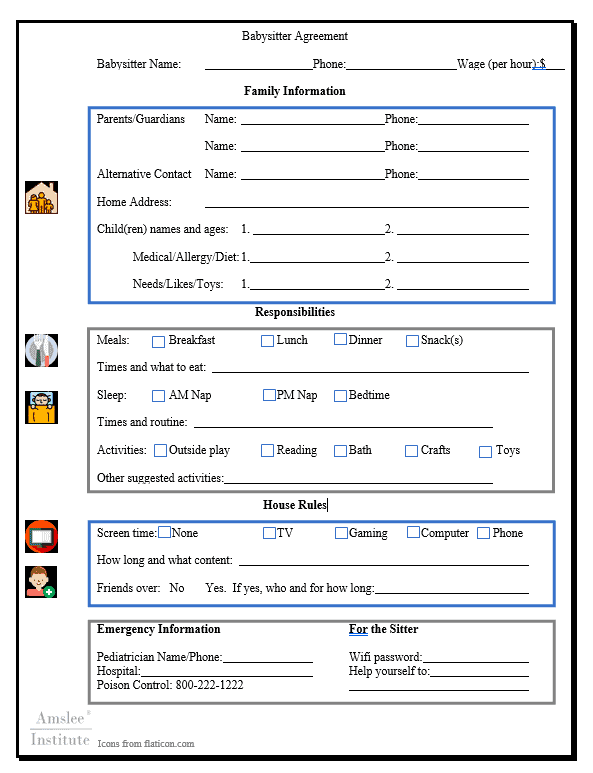Many Nannies, Sitters, and Families are reluctant to have a work agreement (or employment contract). After all, we all hate paperwork and if you have a good relationship, you’re understandably hesitant to rock the boat. Also, many are afraid of formal contracts, worrying it could limit flexibility.
In December 2023, the Department of Labor Women’s Bureau release sample domestic worker agreements including those for nannies.
Taking the time to draft, agree on terms, and sign a work agreement can protect both parties.
Even more importantly, it can ensure everyone has the same expectations. Confusion between a Family and Nanny or Sitter is reduced when everyone is clear on the responsibilities. A too-informal work arrangement can cause confusion whereby, a written agreement can provide clarity and make disputes easier to solve amicably. Setting expectations and guidelines at the beginning of a working relationship will create a foundation for success.
A work agreement is simply a written document that specifies the relationship between an employee and an employer including expectations and compensation. You do not need a lawyer to create a work agreement. When signed by both parties, it is a legal contract as an employer made an offer that was accepted by the employee. Of course, the agreement can range from an outline to several pages. The most important thing to remember is to be very clear about what is expected and how much the position pays as well as the hours. This emphasizes the essential elements to the arrangement, ensuring the Nanny or Sitter arrives in time for parents to get to work or to make their dinner reservation. It will also help the Nanny earn compensation for overtime if the parents run later than planned.

Basic work agreements should all include a few things.
First, the names of the childcare provider and the family or employer as well as the days and number of children. Next, ensure the pay rate including any benefits, the work schedule, and emergency information are included. Take time to list out all job responsibilities and specific duties. For example, is the job solely about childcare or will there be household or pet care duties? This step will help ensure clarity.
It’s also important to cover the house rules for the children. If children are allowed electronics, what content is approved? Video games, online web browsing, and television all have content that may not be age-appropriate for a child. Finally, document any special considerations or needs. Is the child on a special diet or are their behavioral considerations that need attention?
As every family is unique and each position may have different responsibilities, work agreements protect both childcare providers and families by clearly communicating expectations and helping to structure a conversation about the job. To download free templates, visit AmsleeInstitute.com/courses. Meanwhile, here are a few tips to include in work agreements:
Sitters.
Sitters often care for children when the family is nearby, so an easy 1-page form often captures the key information. A Sitter agreement should include the parent’s contact information, emergency contact in case the parents can’t be reached, any medical, dietary, or allergies of the children, responsibilities including childcare, meals or snacks, and supervision of play, and the house rules. The agreement should also include the hourly wage and benefits such as meals and snacks for the Sitter and/or the wifi password.
Full-Time Childcare Providers.
Full-time childcare comes in many forms including weekly care for young children while parents are at work, summer care when elementary children are out of school, families needing overnight care, and vacation care at a resort. Care may be needed for one or more children making each of these positions unique. The childcare requirements will likely have physical care, academic or activities, and logistics. Additional responsibilities may include light housekeeping, transportation, and/or meal preparation. The agreement should include compensation, benefits, hours, vacation, and tax management.
Family Assistants and Live-In Nannies.
Family Assistants and live-in Nannies will have additional considerations including household management and errands, possibly adding pet care, travel with the family, overnight care, and other considerations. The agreement may include a guest policy, require confidentiality, and vaccinations, as well as the use of family equipment and amenities such as a car, pool, or recreational areas.
Work agreements vary greatly, so grab a template and make the modifications and edits that ensure you and your Nanny or Sitter have a clear understanding of the expectations. This will help everyone, including the children as a new person enters the family environment. To learn more about work agreements, watch a free 30-minute course on our parent resources page.


Recent Comments